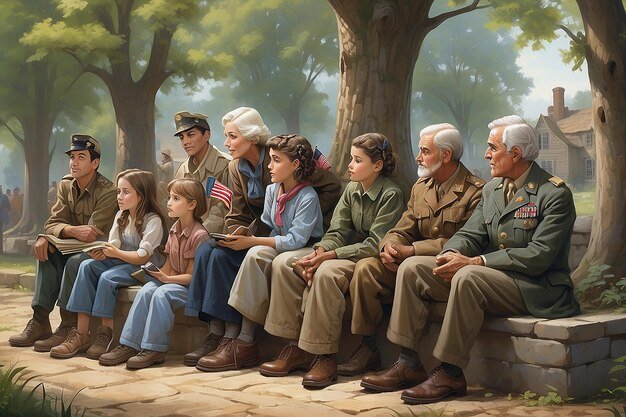When we look at generations, we often think of labels like Baby Boomers, Generation X, Millennials, or Generation Z. These terms help categorize people born in a specific time period, reflecting shared experiences, cultural touchstones, and historical contexts. But what generation was 1908? If you were born in this year, you’d fall into a specific generational cohort. Understanding this can offer valuable insight into the societal, technological, and political climate of the time.
In this article, we’ll delve into what generation someone born in 1908 belongs to, how generational definitions are made, and the unique characteristics of those who were born around that time. We’ll also explore the impact of significant historical events on the 1908 generation, and provide a comparison chart to help clarify the generational boundaries.
What Generation Was 1908?
Individuals born in 1908 are part of the Greatest Generation, which is sometimes also referred to as the GI Generation. This cohort includes those born between approximately 1901 and 1927, though there is some variation depending on the source.
The name “Greatest Generation” was popularized by journalist Tom Brokaw in his book of the same name, where he highlighted the extraordinary lives and accomplishments of those who grew up during the Great Depression and fought in World War II. Members of this generation lived through momentous historical events, including the aftermath of World War I, the Great Depression, and World War II, which shaped their experiences and worldviews.
In the context of the broader generational timeline, people born in 1908 would have been young children during the Great Depression and adolescents during the rise of Nazi Germany, World War II, and other global conflicts.
The Timeframe of the Greatest Generation
To better understand where 1908 fits within the generational timeline, it’s important to know that generations are often defined by significant events, sociopolitical trends, and cultural changes. The exact timeframes of generational cohorts can differ slightly depending on the source, but the following ranges are generally accepted:
- The Lost Generation: Born between 1883-1900, this group came of age during World War I and saw a rapidly changing world in the aftermath.
- The Greatest Generation: Born roughly between 1901-1927, this group lived through the Great Depression and fought in World War II.
- Silent Generation: Born between 1928 and 1945, this cohort came of age during a time of relative peace, following World War II.
Therefore, someone born in 1908 is at the forefront of the Greatest Generation, growing up amidst the challenges of the early 20th century.
Key Characteristics of the 1908 Generation
The Greatest Generation, including those born in 1908, exhibited certain characteristics that were shaped by the unique times they lived through. These qualities include:
-
Resilience and Sacrifice
Those born in 1908 experienced some of the most challenging periods in modern history. As children, they endured the hardships of the Great Depression, which severely impacted economies around the world. As young adults, many from this generation served in World War II, where they were faced with extreme adversity and made great personal sacrifices for the greater good.
-
Strong Sense of Duty and Patriotism
Individuals born in 1908 were deeply influenced by the sense of national pride and duty that arose during World War II. Their contributions, both on the home front and in the military, were critical to the victory over fascism. This sense of patriotism continued to define the Greatest Generation throughout their lives.
-
Traditional Values
Many people born in 1908 grew up in a time of strict social norms and expectations. Gender roles were more rigid, and the family unit was often considered the cornerstone of society. As a result, people from this generation often had more traditional views on family, work, and social relationships.
-
Technological Change and Adaptation
While this generation did not have access to modern technology, they were born at a time when significant advancements were being made. The early 20th century saw the rise of electricity, the automobile, the telephone, and even early airplanes. People born in 1908 witnessed the technological revolution firsthand, from the steam engines of the late 19th century to the innovations of the early 20th century, such as radio broadcasts and the first cars.
Historical Context for 1908
To fully understand the experiences of people born in 1908, it’s helpful to explore some key historical events that shaped the world during their youth:
-
The Early 20th Century: A World in Transition
The early 1900s were a time of rapid industrialization, urbanization, and political upheaval. In 1908, the world was witnessing significant social change, with movements for labor rights, women’s suffrage, and better working conditions gaining momentum. Technological advancements were dramatically changing people’s everyday lives.
-
The Great Depression (1929-1939)
As young adults, those born in 1908 would have witnessed the full force of the Great Depression. This global economic downturn resulted in widespread unemployment, poverty, and social unrest. People struggled to make ends meet, and many had to rely on mutual aid and government support to survive.
-
World War II (1939-1945)
As young adults, those born in 1908 were impacted by World War II. Whether by serving in the military or working on the home front, members of this generation were deeply involved in the war effort. The war not only changed the geopolitical landscape but also had lasting effects on the global economy and the culture of post-war societies.
The Legacy of the 1908 Generation
The Greatest Generation, particularly those born in 1908, left an indelible mark on the world. After World War II, this generation helped rebuild much of Europe, supported the formation of the United Nations, and began shaping the modern world. They were also responsible for numerous technological and social innovations.
As they aged, members of this generation remained a vital part of society, contributing to both the workforce and their communities until the latter part of the 20th century. Many in this cohort witnessed the rise of the post-war baby booms, economic prosperity, and social changes in the 1960s and beyond.
A Generational Comparison Chart
To further understand where 1908 fits within the context of generational definitions, here’s a comparison chart of the various generations. This breakdown will provide a clearer view of the boundaries and characteristics of different cohorts:
| Generation Name | Birth Years | Key Historical Events | Traits and Characteristics |
| The Lost Generation | 1883 – 1900 | World War I, Jazz Age, Great Depression | Disillusionment, cultural rebellion |
| The Greatest Generation (1908 falls here) | 1901 – 1927 | Great Depression, World War II | Resilience, sacrifice, patriotism |
| The Silent Generation | 1928 – 1945 | Post-WWII, Korean War, Civil Rights | Conformity, traditional values, stability |
| Baby Boomers | 1946 – 1964 | Post-WWII prosperity, Civil Rights Movement | Social change, economic growth, cultural revolution |
| Generation X | 1965 – 1980 | End of Cold War, Technology revolution | Independence, skepticism, adaptability |
| Millennials (Gen Y) | 1981 – 1996 | Digital Revolution, September 11th | Tech-savvy, diverse, value work-life balance |
| Generation Z | 1997 – 2012 | Social media boom, climate change awareness | Digital natives, social justice, environmentalism |
Conclusion
In answering the question, “What generation was 1908?” we find that those born in 1908 belong to the Greatest Generation (GI Generation). This cohort was deeply shaped by the challenges and triumphs of the early 20th century, from surviving the Great Depression to fighting in World War II. Their resilience, sense of duty, and traditional values have left an enduring legacy that continues to influence society today.
As we look at generational cohorts, we see how each group has been shaped by unique historical events, technologies, and social dynamics. The Greatest Generation’s experiences serve as a reminder of the sacrifices made by those who lived through some of the most turbulent times in history. For those born in 1908, their legacy is a testament to endurance, patriotism, and the ability to adapt to a rapidly changing world.
By understanding the generational context of the past, we can gain a deeper appreciation for how each generation contributes to the ongoing narrative of human history.

